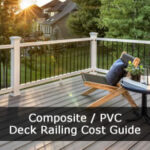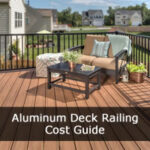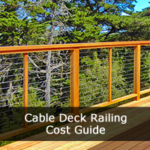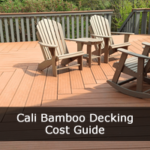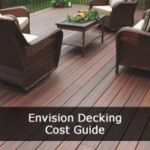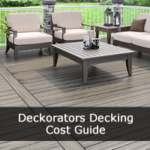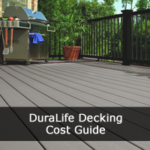Within this Pool Deck cost guide, we highlight all the costs and common deck materials for the decking around your pool, including inground deck pools or above ground pool with deck costs and break down in deck prices.
In this Cost Guide
How much does a pool deck cost?

Pool deck cost averages $20 per square foot installed, or about $10,000 for a 500 square foot deck. Depending on the deck material you choose and whether deck rails are added, cost will be $12.00 to more than $35.00 per square foot.
Above ground pool decks cost 25% to 40% more than those for inground pools because they are elevated and require stairs and railings.
Pool Deck Material Costs
The cost for decking materials is contingent on the chosen material and sizes preferred. For your convenience, the spreadsheet below lists the costs per square foot for each of the eight most popular pool deck materials, installation cost and project totals.
Costs in the table are per square foot.
| Pool Decking Costs | |||
| Deck Material | Deck Materials Cost | Deck Installation | Total Deck Cost |
| Aluminum | $14.50 – $26.00 | $5.50 – $10.00 | $19.00 – $35.00 |
| Ipe | $8.00 – $13.75 | $5.75 – $0.75 | $12.75 – $22.50 |
| PVC/Plastic | $9.25 – $16.75 | $5.75 – $10.75 | $14.00 – $26.50 |
| Composite | $7.75 – $15.25 | $5.75 – $10.75 | $12.50 – $25.00 |
| Tigerwood | $9.00 – $16.00 | $5.00 – $9.00 | $13.00 – $24.00 |
| Redwood | $10.00 – $15.00 | $5.35 – $9.50 | $14.35 – $23.50 |
| Pressure treated Lumber | $6.75 – $13.50 | $6.25 – $11.00 | $12.00 – $23.50 |
| Cedar | $5.00 – $9.75 | $4.25 – $8.25 | $8.25 – $17.00 |
Keep in mind that pool decks for above ground pools will be at the higher end of the ranges in the tables.
Does your pool deck need railings? See our Deck Guide to Deck Railing & Handrail Codes for the answers.
Below is a list of the Deck Railing materials prices, all prices are per linear foot.
| Pool Deck Railing Costs | |
| Railing Material | Cost Per Linear Foot |
| Aluminum | $46 – $61 |
| PVC | $46 – $61 |
| Composite | $46 – $61 |
| Cedar | $31 – $41 |
| Ipe | $34 – $46 |
| Pressure-treated Lumber | $23 – $31 |
| Redwood | $33 – $41 |
| Tigerwood | $31 – $43 |
As you likely know, fencing is required for inground pools to prevent accidents. Fencing costs can add significantly to the project.
Why Have A Deck Around Your Pool?

Ground level and above ground pool decks beautify the area/property, providing a welcoming aesthetic, but it will also create a safer walking environment. As any parent knows, kids run—even when they are not supposed to. A deck will allow for more foot traction around the pool than an open grassy area, keeping your kids and their friends safe.
As for you and your friends: A deck outfitted with deck furniture becomes a relaxing place to lounge, keep an eye on swimming kids or enjoy after your own swim.
Pool Deck Materials
Here are the most common deck materials:
Aluminum Pool Deck
$19.00 to $35.00 square foot installed
Pros:
- A long-lasting product that will not warp, crack, or fade.
- Lightweight (half that of wood), durable, and resistant to corrosion and rusting.
- Will not burn and stays cooler in direct sunlight than PVC/composite or wood.
Cons:
- Costs more than PVC/composite, cedar, and PT lumber and comes in a limited palette of colors.
- Cutting aluminum is laborious.
- If the deck is poorly installed or improperly coated, the deck will likely creak.
Ipe Pool Decking
$12.75 to $22.50/square foot installed
Pros:
- Unique, rich beauty
- Resistant to overheating, insects, fungus, dents, and scratches.
- Unlikely to warp or twist.
- Durable due to its density.
Cons:
- Costs twice or three times as much as PT lumber or cedar.
- Due to its darker hue, it can easily become hot under direct sunlight.
- Its density makes it more difficult to install than other materials, such as PT lumber, PVC, or cedar. For example, pilot holes are usually drilled for fasteners.
Polyvinyl Chloride (PVC) / Plastic Pool Decking
$14.00 to $26.50/per square foot installed
Pros:
- A plastic material, it is made to last long, as it will not rust, stain, scratch, fade, or dent.
- Will not need staining or sealing.
- Does not burn easily and is slip-resistant.
- Altogether, it requires minimal maintenance and retains its coloring over time.
- A good range of colors is available
Cons:
- Very expensive short-term cost (higher than PT lumber, cedar, and composite).
- Labor-intensive to install.
- May not resist heat as well as other materials if darker surface colors are used.
- Deck may develop creaking spots.
Composite Decks
$12.50 to $25.00/square foot installed
Pros:
- Wood-like texturing and a range of colors and hues.
- Will not rot, splinter, or attract insects.
- Will neither warp, bend, nor fade in the sunlight, and it is known for being long-lasting.
- Made of 80% or more recycled material.
- Composite requires minimal maintenance.
Cons:
- Prone to scuffing and staining (as from grease or food).
- Heats up when in direct sunlight.
- Composite also requires a higher initial cost than materials such as PT pine.
Tigerwood Pool Decking
$13.00 to $24.00/square foot installed
Pros:
- Visual appeal of natural wood
- Naturally resistant to insects, scratches, rotting, splitting, denting, and chipping.
- Works well in all climates.
- Sealing and staining are not required but may be used in order to retain deck colors for a longer period of time.
- Low-to-moderate maintenance required.
Cons:
- Dark colors will absorb heat, which can be hot for bare feet.
- Costs much more than PT lumber and cedar but tends to last longer than the two.
- Higher installation price due to a slower installation period (in comparison to softer woods).
Redwood Pool Decks
$14.35 to $23.50/square foot installed
Pros:
- Natural good looks compared with synthetic and aluminum decking
- Accepts stain and allows sealer for resistance to moisture.
- Resistant to warping, twisting, and shrinking.
- Retains a cool temperature under direct sunlight for a longer period than many other decking materials.
Cons:
- Requires consistent maintenance to prevent moisture damage.
- Cheaper grades of redwood (i.e., sapwood) are prone to rotting if sealant is poorly or inconsistently applied.
- Can be easily scratched and dented.
Pressure Treated Lumber (PT) Pool Decking
$12.00 to $23.50/square foot installed
Pros:
- Durable and can last 12-15 years with proper maintenance.
- Costs less than most other decking materials.
- Resistant to insects and rotting, and it can be put into the ground with less risk of deteriorating.
- Can be easily cut and installed.
Cons:
- Some preservatives in the wood corrode standard screws. Stainless or coated screws must be used instead.
- Poorer grades of PT lumber are susceptible to warping and splintering, especially in comparison to other wood materials.
- Requires regular washing and staining in order to retain its appearance and performance.
Cedar Pool Decks
$8.25 to $17.00/square foot installed
Pros:
- Naturally resistant to rot, insects, moisture, and it will not warp or crack.
- Renewable, biodegradable, lightweight, and it is easy to cut and install.
- The material is also softer for one’s foot than PT wood.
Cons:
- Requires a lot of maintenance to retain its color, as it is susceptible to deterioration.
- As a whole, the material will not last as long as other railing materials, such as PVC. Can dent and scratch easily.
- Costs more than PT lumber (but less than composite).
For more information on each of these decking materials, select each of the decking materials types via this link. For general maintenance tips and deck cleaning prices, visit this link.
An Aluminum Pool Deck?

Aluminum provides excellent long-term value.
Unless you prefer a different deck material than above, we recommend choosing aluminum for your pool deck. In comparison to wood, PVC, and composite, aluminum’s ability to retain a cooled temperature in the sunlight means children and adults alike will have an easier time walking across the deck without the risk of burning their feet. Also considering that wood can have the possibility of splintering, an aluminum deck will save you the headache of dealing with that.
Aluminum certainly costs more than many of the other decking materials, as we noted above, but its long lifespan and benefits will certainly satisfy you and your family while saving you money over time and can also be offered by alot of the big decking brands such as TimberTech, Trex, Azek.
Negotiating the Best Price with the Most Quality
As you reach out to professional building contractors, consider these three tips below to achieve the most affordable price for you while retaining great deck quality:
- Ask more than one deck contractor for a quote. Comparing quotes will allow you to navigate which contractors have the best deck prices for the kind of deck and deck features you are looking for.
- Tell each deck contractor that he or she is competing for work. If contractors know they are competing, they will be less likely to make shortcuts in the deck building process or over price you for your deck.
- Do not settle on the cheapest quote without first looking into the company’s previous work. The lowest price may initially seem like the smartest choice, but it could also denote that the quality of the deck is lacking. In this case, the cheapest price will be less financially costly in the beginning, but the deck may not be up to your standards in appearance and may cost you more in repairs over time.
When Planning for Your Investment
As you map out the details for your deck, it would be wise to consider the length of time you expect to stay in your house before moving. Provided that some decking materials are costlier and have longer lifespans than others, it would be more beneficial to invest in a cheaper material for a deck if you are considering moving within five to ten years. Alternatively, if you know your stay will extend beyond ten years, purchasing a higher-grade deck material will save you money and frustration in the long run.




